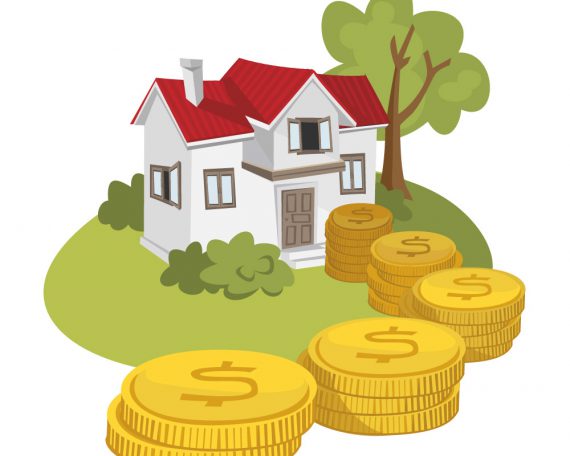
by Ajay oberoi | Consumer Proposal, Credit Counseling, Credit Repair, Debt Management
Buying the first-ever house is like a dream come true. The four walls, a roof to sit on, and the fences around it with a small vegetable garden – yes, all those who have gone through the process can understand the sentiments involved here. If you see it from a buyer’s perspective, you will understand that for them it is not a house they are buying, but a home they intended to make. So, it has to be perfect. However, we should not forget about the most important factor involved in this process: how to finance this decision. Mostly, people go for the house loan option. It is easy and it lets you have your dream instantly come true. It allows you to pay them off while living in your new comfortable home. However, there are few steps that must be taken, before you finally succeed in getting a house on loan.
- The first thing to do is to fill out a loan application, after which your application will be sent for review. Once your application is reviewed and approved, you will be given a bank letter stating the amount of money that has been approved for your house loan.
- After getting the bank approval letter and getting all your documents verified, you can go out and start looking for the house, ideally the one that comes under the amount you have been approved by the bank and whose monthly mortgage installments you can conveniently afford. It will be better to hire an estate agent so you can get a house at fair market value.
- Once you have selected the house, you will have to start the bidding process and your agent will help you with it. When you have chosen a house, you will make the purchase and send those details to your lender, who will use those documents to start your loan process.
- After the process has begun, the bank will visit and put the house under appraisal to make sure that the property you have purchased is up to the city standards, and the money they have lent is being used in its exact purpose.
- You will need to hire a mortgage consultant who will sit with you and work to make sure that the house you are buying is insured, all the reserved rights have been transferred in your name, and that there is a smooth transference of all the legal rights from both ends.
- Your house loan will finally be approved once all the qualifications have been met and the house fits on their set standards. After that, a final date will be set where you will go sign the papers and close the deal. From there on, your loan servicing will begin.

by Ajay oberoi | Consumer Proposal, Credit Counseling, Credit Repair, Debt Management
Living in this economic era is not easy. It can leave you exhausted, deprived, and confused about how to make do with your limited resources. It is true, resources are scarce, and we have to work too hard to earn them, which is why sometimes it becomes difficult to go on spending the way you like. There are always things we need to save for. When it comes to savings, the first thing that comes into our minds is to create a budget and stick to it in order to avoid spending more than it is needed.
Talking about living on a strict budget, let’s admit that it is not easy at all. However, it’s not that difficult either, if you manage to take care of a few things. It all depends on your attitude and how you manage your resources. If you have proper management, then even little may seem more. However, oftentimes, I have seen people making such mistakes that only make it difficult for them to stick to their budgets and give in to their spending habits. Living on a budget is not that difficult, but there certain things that make it hard for people to stick to it.
- While deciding to live on a budget, we need to know what we are aiming for. You must know what you are cutting back for, what will be the end result, and what will you achieve after all these savings. You need to have a clear goal in your mind. There is always a precursor, a need that makes us restrict our spending. Otherwise, the retrains will take over you after some time, and you will lose all the motivation to carry along with your plan. You can only stick to a budget if you have a motivating goal in front of you – a holiday, new mobile, or if you are going big, then probably a new house by the lakeside!
- Yes, the whole purpose of making a budget is to limit your expenses and tie the loose ends, which you can trip over. However, a fixed budget will only leave you stressed and burned out. You need to ensure that your budget is flexible enough to incorporate some adjustments. If your budget is too fixed, you will eventually give up. You do not have to think that just because you are on a budget, you cannot afford to treat yourself on a good dinner or drinks with your friends in the afternoon. Be realistic and have some flexibility in your budget.
- There are certain expenses that only need to be paid once a year. They almost get lost at the back of our mind and you might not remember until the deadline arrives. It could be your car tax or your yearly online subscriptions – all these can come up all of a sudden, leaving you in panic, and take a hit on your budget. Avoid this. Calculate all your one-off expenses and take out a little amount for them from each month’s budget, so it doesn’t become a headache at the end.

by Ajay oberoi | Credit Counseling, Credit Repair, Debt Management
When you are starting a business, especially if it’s your first entrepreneurial venture, you have many emotions attached to it. You are excited. You are hopeful and yet doubtful. You are almost overwhelmed. This is all because, behind all those emotions, there is one worry that keeps you on your feet – how to fund your business. You have the vision. You have the goal. You have the enthusiasm it will take to run that business. However, what you are short on is cash to run that business. Young entrepreneurs are often faced with this dilemma when starting their first business and maybe this is why many of them bail out on the journey before it has even begun.
You do not necessarily have to have a drawer full of cash to start your own business. You can go to venture capitalists to invest in your business. You can pitch your idea to someone who has the money, time, or resources to put in, or you can choose to apply for a loan to start your small business. Getting a loan to start up a business when you are fresh in the market with no background or history to prove your credibility might turn out to be a daunting experience. You might be focused on all your dreams, visions, and aspirations regarding your business, but the lenders would only care about you having a secure way to pay them back.
However, we are listing down the basics you should check off on your list before applying for a small business loan.
- Before you go to a lender to ask for a loan, you need to have a strong business plan to back up your business claims. It should include all your future budgets, prospected sales, and all the expenses you will have to incur. You must also include all your revenue resources, as well as your suppliers and customers. All this must be laid down clearly in the form of a solid business plan, so your lender will be convinced that you are diligent about your plans.
- You cannot expect the bank to give out a full-fledged loan to you. They sometimes do, but many times the bank would want you to contribute at least 15% – 20% of what you are borrowing from them. It is possible that you will have already saved up some amount before going to the bank. Other than that, have any collateral ready to put up against the loan because it is a new business, an uncharted territory – the bank needs this security.
- Get all your documents ready before going to the bank. Your credit receipts, your income statements, your tax receipts, all the future projections, everything that can be legally required by the bank. Call them up and inquire beforehand what they will be required, and then take that along when you go to meet them.
- The bank will need to see something official here. You need to get your business registered and obtain all the permits and licenses that you will need to operate your business activities. The bank will verify them and ask you to fill in credit forms. After that, you will have to wait until the lender makes their decision.

by Ajay oberoi | Consumer Proposal, Credit Counseling, Credit Repair, Debt Management
Debt is the money borrowed with the intention of repaying with interest. When you can’t pay your debt, you can be sure to be in trouble in many cases. Debt management is, therefore, very necessary. Basic finance handling strategies can help you take better care of your money and expenses for a lifetime.
If you have accumulated debt over time, you will need debt counseling to free yourself from the financial trouble you are in. Following are some of the things to look out for that suggest that you have an accumulated debt:
- You have little to no monthly savings.
- You pay for food and gas and other basic necessities using a credit card because you are left with very little money after paying your bill.
- You pay for a credit card using the cash advance you get from another.
- You get a lot of calls from lenders.
- You fear that you won’t be able to make the minimum required monthly payments on your debt.
What is a Debt to Income Ratio?
Debt to Income (DTI) Ratio is a number calculated by dividing your monthly payments on the debt by your monthly income. You can assess your debt situation by calculating the debt to income ratio. When you are looking to get more debt, debt to income ratio is basically what lenders will use to assess your ability to repay the money that you are borrowing and manage repayments every month.
How Can You Calculate Your Debt To Income Ratio?
The calculation of the debt to income ratio is pretty simple and can be completed in three steps.
Step 1: Calculate the total minimum monthly payments on your debts
While figuring out the total amount you need to pay each month on your debts, take account of all your recurring debts, such as:
- Mortgage or rent
- Home equity loan payments
- Auto loans
- Student loans
- Furniture loans
- Minimum payments on credit cards
- Child support payments or alimony
- Any other debt
Exclude your basic expenses like gas, food, and utilities from the list.
Step 2: Calculate the total monthly income of your household
At this step, you simply have to add up all the money you receive each month. The money may include:
- Gross income (excluding taxes and deductions)
- Alimony
- Child support
- Bonuses or overtime
- Other income
Step 3: Finally, calculate your DTI ratio
Debt to income ratio can finally be calculated by dividing the total amount of monthly payments on your debts with your gross monthly household income and expressing it as a percentage.
For example, if the total monthly debt payments are $1800 and the monthly income is $3900, your DTI ratio will be 1800 divided by 3900, which is 0.46 or 46%.
How much is a healthy DTI ratio?
A debt to income ratio of 36% or less is considered healthy, meaning you can easily settle your monthly debts. However, you should avoid acquiring more debt.
If that number exceeds 43%, you should consider yourself in trouble. And you must seek professional help if your debt to income ratio is more than 50%. Legal financial advisors can help you come out of that financial crisis.

by admin | Bankruptcy, Consumer Proposal, Credit Counseling, Credit Repair
Credit card companies and banks look at your credit score while making the decision to lend you money. Your credit score reflects your ability to return credits. It is a number that depicts the likelihood of you repaying money without struggling.
Lenders check your credit history in order to calculate your credit score in Canada. If your credit score is low, they will see this as a risk for lending you money. Different companies have different criteria to assess the level of risk by looking at your credit score.
There are many things that can damage your credit score in Canada, such as delayed payments of bills, applications for a large number of credit cards, etc.
In case of a low credit score, you should first check the information available in your credit report. That information must be correct. If not, contact the responsible authorities. If the information is correct, the next thing you should be doing is thoroughly and carefully reading the report to assess what factors are causing a decrease in your credit score and how you can improve them.
Here are a few tips that can help you improve your credit score in Canada.
Pay your bills on time
You should always be careful about the time you take to pay your bills. Delayed payments of bills can negatively influence your credit score in Canada. Although your credit report does not have records of the payments of your utility bills such as phone, electricity, and cable, there are some mobile phone companies that may inform the credit-reporting agencies about your late payments, which could negatively affect your credit score.
Clear your debts quickly
You should be looking to pay off your debts as soon as possible. Prolonged and accumulated debts have a bad influence on your credit score in Canada.
Be watchful of your credit card limit
Avoid going overboard with your credit card expenses. Do not cross the credit limit on a credit card, no matter what. Your balance should always be well below the limit of your credit card. Higher balance has more chance of affecting your credit score in Canada.
Prioritize the payments you have to make
Canadian credit reports do not generally include mortgage payments, although they are very important. So, it’s smart if you prioritize clearing your credit card, lease, and loan payments first and on time. This will help you maintain a good credit score in Canada.
Limit your credit applications
You should be careful about the number of applications you make. You must avoid making too many credit applications. Too much inquiry from the potential lenders about your credit can negatively affect your credit score in Canada. However, the credit score is not affected if you have queries regarding your own credit report.
Have a credit history
One of the reasons for one’s low credit score in Canada is the absence of credit history. Make sure that you have a proper record of the debt you owed and the payments you made back. Credit history can be built using a credit card.
Maintaining a good credit score is important and has its benefits. By implementing the above-mentioned tips, you can ensure a better credit score in Canada.








